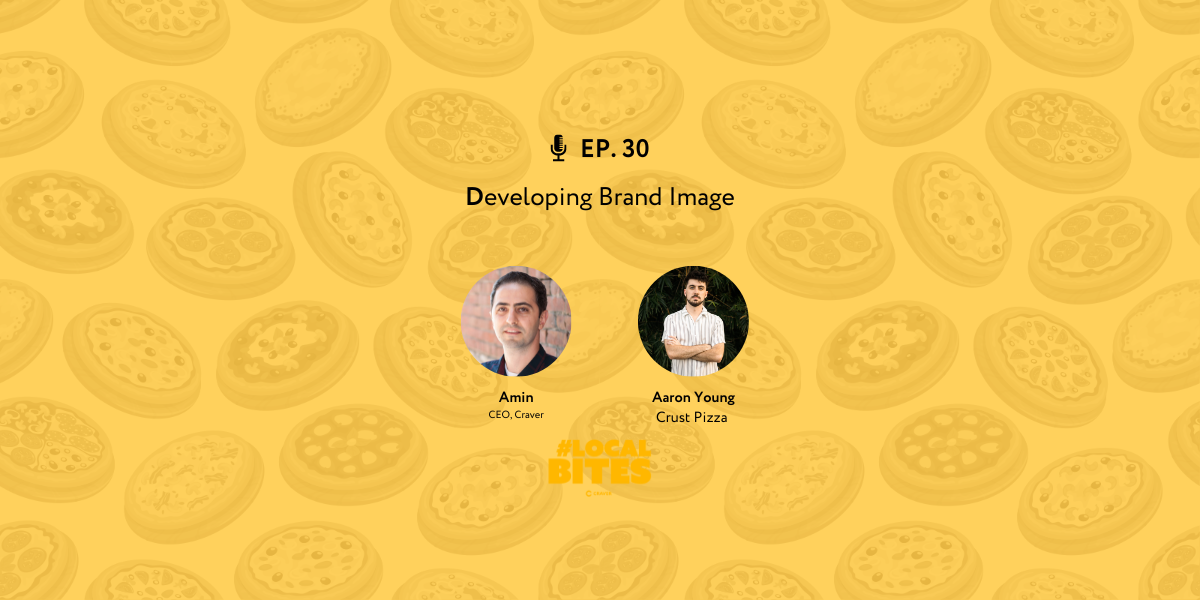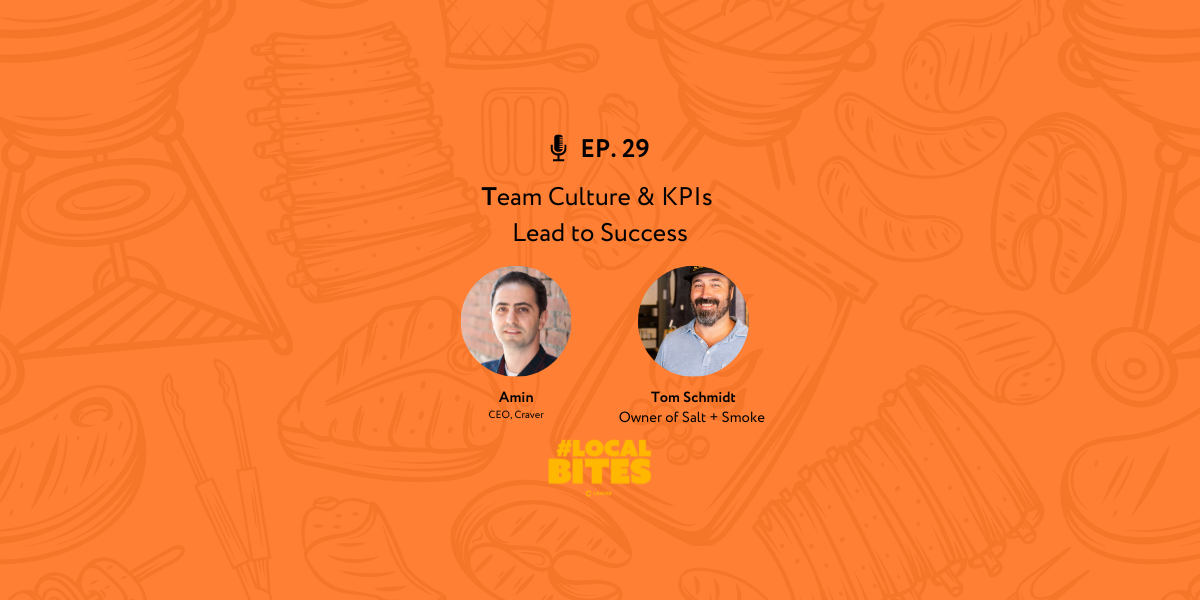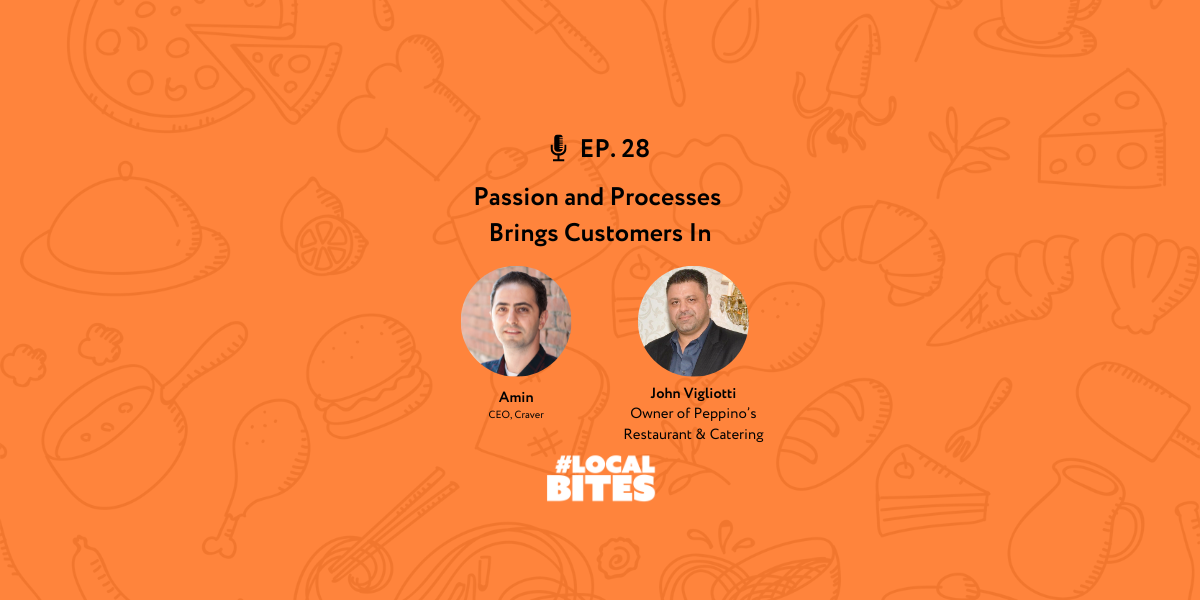Consistency, Quality & Timing with Michael Pustai
Sometimes it takes a little out-of-the-box thinking to come up with an amazing restaurant concept. Michael Pustai, owner of Hops Kitchen used his creativity to come up with a brand that runs the kitchen in breweries.
In this week's episode, we got the scoop on how he came up with the idea, and how he has continued to expand his brands.
Or, listen on your preferred podcast service:
In this conversation, we covered:
An Overview of the Hops Kitchen Concept
An Overview of the Hops Kitchen Concept
What were you doing before Hops Kitchen?
I started in the kitchen when I was around 14 years old. Throughout my school years in High School, and then I wanted to be a teacher and decided that wasn't for me.
I dropped out of college, moved down to Florida and this guy was painting his new restaurant that he had just built. A little fish shack right on the water. I asked him for a job, and then he showed me everything, fillet fish all the way through changing friars and lots of sauces and items like that.
So I did that for a while, and then I moved back to Ohio and started as a grill guy in a really busy restaurant. I moved my way up to head chef within two years.
Then, I had a family, moved out to New Mexico and worked for a resort called House New Mexico, and got the ship job of the whole resort. I oversaw many restaurants in the resort, and then in that little town, somebody opened a brewery and needed somebody, an entrepreneur to start a kitchen for his brewery. So I quit my career and went all in. I started Hops Kitchen.
Starting your own business is a big jump to make. Take us through that.
Hops Kitchen started about 8 years ago. I worked for the record for 2 years, and then I was doing little farmer's markets for the resort. They were kind of expanding around the community and doing other things too.
I did some Asian food, and some guy was like, "I didn't know you can venture out of your career at the resort." I said, well I don't know. This is kind of the first time." He said, "I have a kitchen, and I would like to open and I need somebody to run it." So I ended up doing that. My career and the town were really small. The resort kind of understood that I was doing both and I needed to pick one. So I went all in.
Actually quite a really big career. The family, a brand new family, just went all in. I just had the guts to do it. I was very successful right from the start.
Expanding the Brands
You've been expanding. Take me through that journey.
When I was doing this, I quit my career and I started Hops Kitchen, I hired somebody to help me brand Hops Kitchen. At first, it was called the kitchen at so and so brewery and I wanted to, my dream was to have a kitchen partner up with breweries and keep it have a Hops Kitchen at this one, have a Hop Kitchen at that because I know the niches. The breweries want to just concentrate on beer and they had rotation food trucks.
I was, my niche is really special because I would sign year-long contracts. That way the brewery owner didn't have to schedule rotating food trucks which cost them a lot of money by them not showing up or spending a lot of money just scheduling and so forth. They kind of get peace of mind when we make a deal together.
Then I'm able to use their beers in my recipes and all that stuff, and co-market each other.
When I was in New Mexico the guy that I teamed up with ended up thinking he could do it himself so he kind of like strong-armed me out of the company once started. I moved down to Virginia my mom was living out here and she said there are so many breweries here you can bring your concept down so ended up moving out here.
Got a job just to hold me over until I found the right brewery to partner with, and it was just kind of love at first sight with this one brewery. I just started doing a whole hog roast on the weekend for him and then everybody just loves my food. And he's like can you do every day instead of three days? Then my menu evolved and it was really creative and it really drew his brewery to the next level as well as me going to the next level and then a lot of the breweries around this area were seeking me out.
I started in Hops Kitchen at two other breweries in, not far away where they were over-competing with each other and so then I just kept going like that and I have a lot of smaller sister brands like Za' Pizza brand. Basically, I'm making a lot of small brands right now that I could offer to many breweries and that way if a brewery down the road has Hops Kitchen they can have another concept.
How did you expand to a new brand?
I kind of got pulled. The brewery here demanded pizza and we have food trucks that we just bring on-site. We kind of, it's a hybrid we kind of create a counter inside the facility and take orders and we even do small items like pretzels and nachos out of there. Then our food truck is connected to the building and we pass food through the wall more or less.
I like to call it a hybrid of a food truck and restaurant kind of thing.
He wanted pizza and I didn't want to do pizza. One day I walked in and there was a pizza oven on the ground he goes you're going to do it or I'm going to find somebody else to do it.
I'm very territorial in this area, especially with the contract that I have here. I did a lot of research and Detroit-style pizza was the new trend and I didn't want to be compared to another pizza place. Everyone, every location every city, has eight pizza restaurants and they're all pretty similar. I wanted to be different and so the pizza spoke to me.
When we, apply for big festivals like Bonnaroo, I don't do any out of the West Coast, but East coast, like Bonnaroo or some country, big festivals. I gave 'em a smortgage board of all the brands I can do. And that gets me in the door because they might already have a pizza guy, but they don't have an Empanada guy, and that's another one of my brands.
Or if they have empanada and they don't have pizza, well I have that brand, so I'm able to. If you just hone in on one brand, I think it kinda takes away from the—what's the word? What I feel like running that day. More or less. I could, It's flexible is the word I was looking for. So it's very flexible.
And then when I eventually am approaching a lot of breweries, I can be like, "What out of the eight brands I have, do you want in this food truck?" Or "how many do you want in this food truck?" So I've never explored the other route to like get a Dairy Queen or a Five Guys or, a jersey. I feel like eventually, I can be one of those guys.
Take me through what COVID looked like for your business.
It was very scary times. I actually was preparing for a really big festival where I was going to sell like $60,000 worth of food. So I just got my first truck of like over 20 grand worth of ingredients, and then it shut down. So I had to scramble and figure out how to get rid of this, get rid of it, and or get some cost out of it.
So at first, I crushed Facebook Marketplace and just was kind of selling out my back door. I went to the YMCA on Thanksgiving and I had a bunch of Turkey legs, bare festival, so I donated over 200 Turkey legs and I went there and cooked them and handed them out to anybody that needed food. Which I sold out pretty quickly.
Not, I didn't sell it. I gave it away. So it was a struggle to like, get rid of my coolers getting empty. I never really took a break. I went into my warehouses. I kept some of my staff employed by reorganizing areas of the warehouses, painting, doing a lot of painting, and organizing. So we did that for many months that I think we were only done or closed for three.
Now, I was also lucky that the brewery that I was a part of has a massive outdoor space and around us, there's not a whole lot of outdoor dining. So when we were able to open six feet apart, uh, mainly outside, no contact order and all that, we were already set up for that in a way. And my business is a lot about timing, so I already had the no-contact app ordering, which definitely excelled.
In all the downloads that I've had, the owner of the brewery was just pumping out picnic tables left and right. So we were able to stay open. We were only closed for three months, and then all the surrounding places in the city weren't able to do any dining really, unfortunately for them.
That kind of like, we were, we were packed, but also covid safe. We were kinda lucky, on that then. And then after that, yeah, we were just, we'd stayed open, so we were only close for three months and we stayed open. So I'm not sure if that's the story for everybody, but, I know a lot of people did really well during Covid, and I know a lot of people that unfortunately did not. Then obviously the government stuff was very helpful, for us at least.
Doing More With Less Staff
In the past while, the industry has been having issues with staffing. Have you experienced that?
Well, in my honest opinion, the people that we attract, we don't have much front of the house. We have mostly, like it's a quick service restaurant, more or less people come up to the counter in order and then they come back and pick it up. So we're not really tipped-driven. So we don't get a lot of the servers or bartenders that would apply to us.
That demographic of who's cooking, and I don't need any culinary people as well. Um, I was able, I like to do more and pay people a lot more and doing more with less is kind of my model.
And the people that I kept through Covid are still with me today, and I always gave 'em enough hours.
I paid them really well, and that way I don't have any turnover rate on that. It's the, and then I have college kids in the summer that help, but we're still always shorthanded. I've tried. Indeed. It's, I feel like I just throw my money to them and I don't get anybody, um, no dice on them, but I just, it just doesn't work out for me.
I sometimes get lucky with somebody just walking through the door, who had been dining at the location. Um, but mostly I'm just praying and hoping that somebody good comes along and when they're good, we keep them. We try to have a fun environment, so it's not so monotonous.
I mean, we have really crazy days, but we make them fun and we look forward to those crazy. So it's just like really the mentality that you have instead of like, "Oh crap, it's Saturday, I'm gonna get my butt whooped." No, let's see how much we can do today. You know, and let's try to beat last Saturday.
And then, I might throw out some incentives here and there as well, but it's,—I mean, I can hire four more people right now, but I just not gonna use Indeed. There's really, I didn't have to like slim down my menu or anything like that.
We just got more efficient.
Amin Yazdani is the CEO and Co-Founder of Craver, a fast-growing mobile platform for restaurants, helping them grow and retain a loyal customer base.






